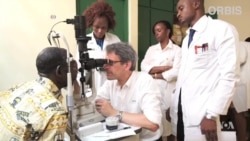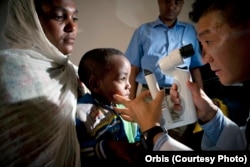International charity Orbis is helping the visually impaired through a flying hospital staffed by volunteer doctors and medical workers. It recently unveiled a new version of its airborne clinic, which will take the latest medical technology around the world.
The world's only flying eye hospital was upgraded in a newly outfitted MD-10 aircraft, unveiled in early June in Los Angeles.
It's the third version of the aircraft for use by volunteer doctors such as pediatric ophthalmologist Dan Neely of the Indiana University School of Medicine. He says this plane has state-of-the-art technology, but partner facilities on the ground sometimes do not. He has been a medical volunteer in Jamaica, Southeast Asia and Africa.
"You can be in Zambia and the power goes out in the middle of the surgery," he said. "You can be there needing to scrub your hands for the surgery and you have to use a bucket of water because the water's gone out."
Orbis partners with local clinics as it takes its programs to Cameroon, Ethiopia, Ghana and Latin America, says Dr. Jonathan Lord, the charity's global medical director.
"You've then got Asia, where we work in China, we work in Vietnam," he explained. "We have projects running in India, in Bangladesh. We work in Indonesia, so we take the plane wherever our gap analysis, wherever the needs analysis says we can be of help."
More than 285 million people in the world are visually impaired, most in low income countries, according to the World Health Organization. It says 80 percent of visual impairment issues can be prevented or cured.
Orbis says 19 million children are among the blind and visually impaired and with early intervention and comprehensive treatment, half of those children could have their sight restored.
Among those anxious to help are volunteer pilots. Captain Gary Dyson usually flies cargo planes for FedEx, but takes time off to fly for Orbis.
"When you see a child who can't see on Monday and they can see on Wednesday, you're hooked," he said. "You want to see it again and again."
The change in a patient's life after surgery can be dramatic, says Rosalind Stevens, a volunteer doctor from the Geisel School of Medicine at Dartmouth College in New Hampshire. She says, "When we remove the patch the next day, frequently the patient breaks into a big smile."
Orbis provides advanced medical training for doctors and nurses in the countries where it lands, in a 46-seat onboard classroom that is linked electronically to the plane's operating room, said Orbis CEO Bob Ranck, a retired U.S. Air Force brigadier general.
"We teach others to save and restore vision," he said. "And we teach health care systems to make it a priority so the prevalence of blindness in their country will come down."
From 2009-2015, Orbis conducted nearly 20,000 doctor trainings and more than 150,000 training sessions for nurses and medical technicians, in addition to advocacy work with local officials. It performed more than 18 million screenings on board its plane or at partner facilities.
The newest version of the flying hospital, donated by FedEx, will make preliminary flights to several U.S. cities, then conduct a medical program in Shenyang, China, in September.











